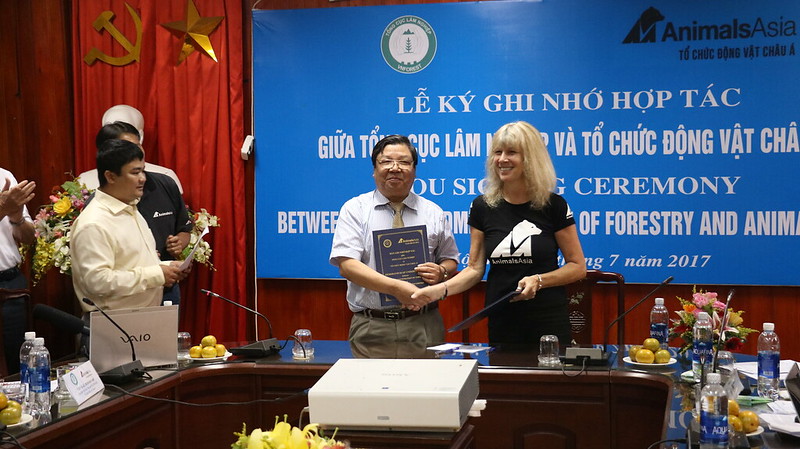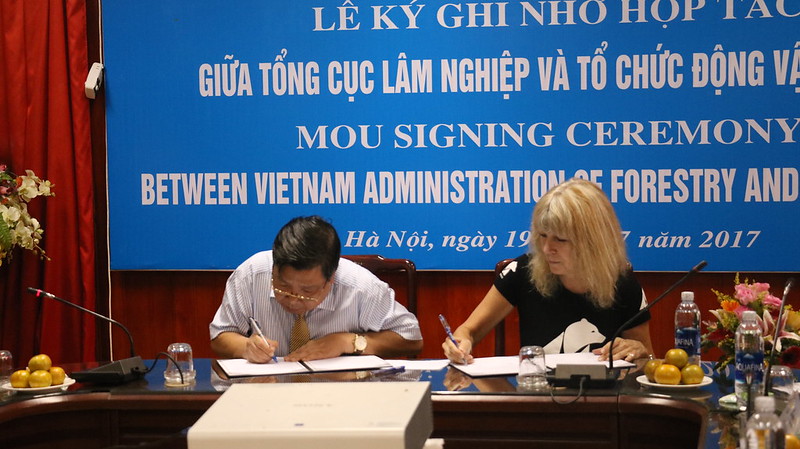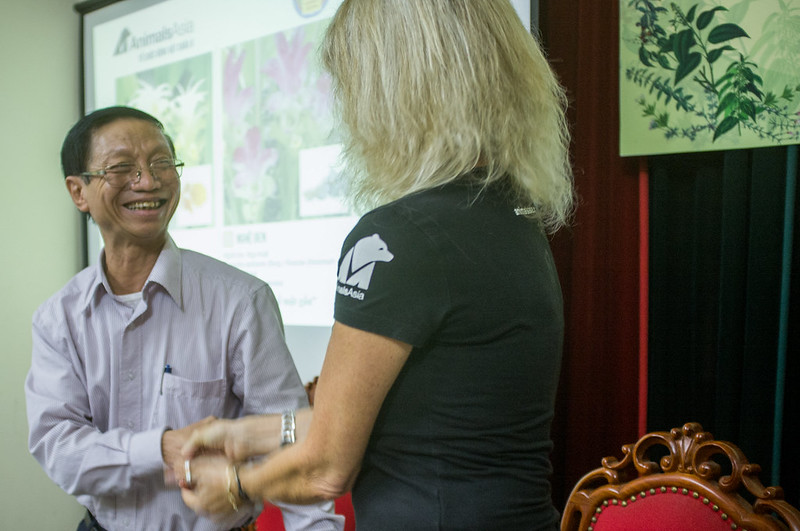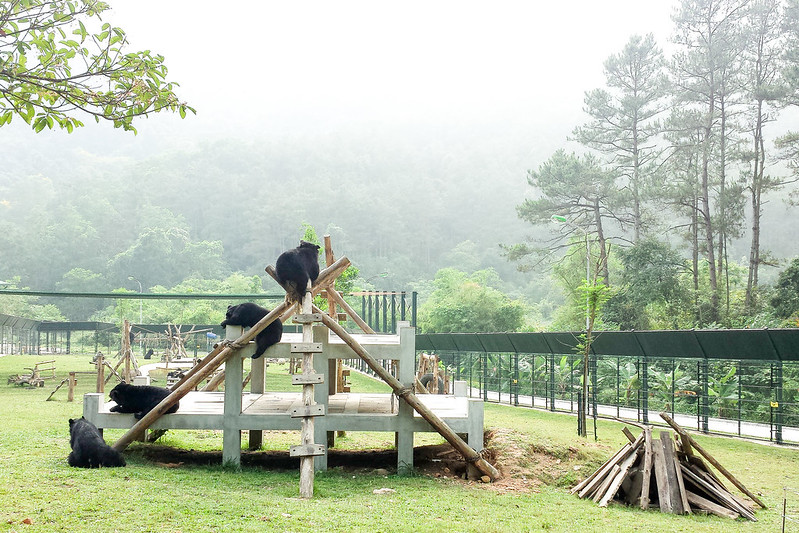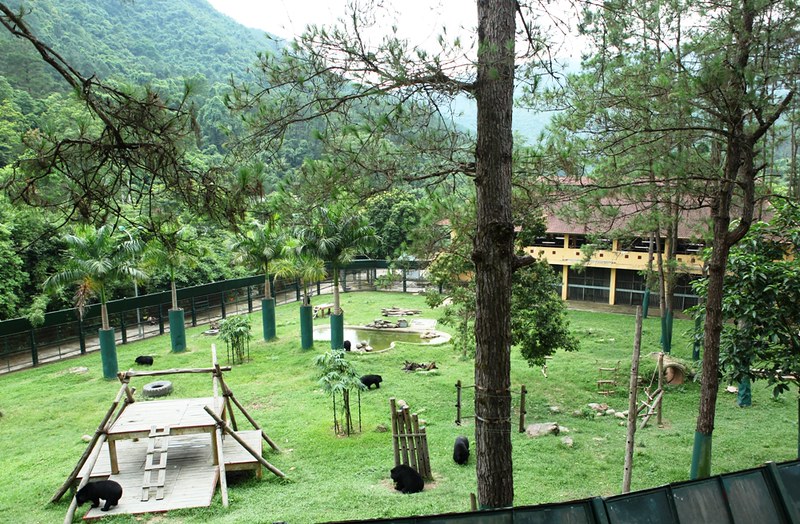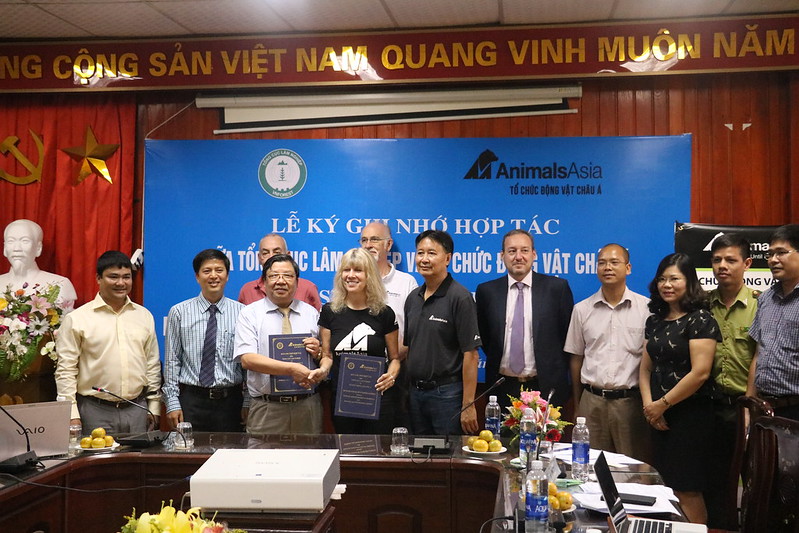BREAKING NEWS: Vietnam agrees plan to close all bear bile farms
19 July 2017
In a historic move the Vietnamese government has agreed a plan with Animals Asia to finally end bear bile farming in the country.
The Memorandum of Understanding (MOU) outlines an agreement between animal welfare NGO Animals Asia and the Vietnam Administration of Forestry (VNFOREST) to work together to rescue the remaining bears still caged on farms across Vietnam – believed to be around 1,000.
The document was signed and announced at the Ministry of Agriculture and Rural Development in Hanoi on Wednesday 19 July.
Mr Cao Chi Cong, Deputy General Director of the Vietnam Administration of Forestry, under the Ministry of Agriculture and Rural Development, joined Animals Asia CEO and founder Jill Robinson MBE in signing the MOU.
The move follows the MOU between Animals Asia and the Vietnamese Traditional Medicine Association signed in 2015, agreeing to ensure a complete end to bear bile prescription among traditional medicine practitioners by 2020.
This is anticipated to continue a significant reduction in demand and contribute towards the ending of the illegal market for bear bile.
Today’s agreement is effectively one that will finally close the loophole that has allowed bile farms to continue despite the illegality of the trade.
The MOU commits the government to ensuring no bears are allowed to be kept by private households – where illegal bile extraction can take place – and that the approximately 1,000 bears currently held in captivity around the country are moved to sanctuaries.
Animals Asia’s Vietnam Director Tuan Bendixsen said:
“This historic document ties NGOs and the government of Vietnam to a common goal - the end of bear bile farming in Vietnam.
“Crucially, the government has agreed to close the loophole that has allowed bile farming to persist for the last decade. By signing this MOU, they have agreed that there can be no bears kept on farms, because as long as they are there, they will suffer extraction.”
Animals Asia has so far rescued 186 bears in Vietnam since setting up its sanctuary in Tam Dao in 2008.
Bear bile farming has been illegal in Vietnam since 1992. In 2006, every bear in captivity was microchipped so that no new bears could be added to farms. But with the country lacking resources and expertise to build rescue centres and care for the animals, households were allowed to keep the bears on the government’s behalf having agreed not to extract bile. This loophole has effectively allowed bear bile farming to continue until now.
Since bear bile farming became a common practice in China and Vietnam in the 1980s, wild populations have been decimated to meet the demand the industry created.
A report by Animals Asia and Free The Bears released in 2016 found that wild populations across South East Asia had fallen dramatically with precious few pockets of wild bears existing in Vietnam today. It had been wrongly anticipated that farming bears would actually help conserve wild bears.
In 2005 bear bile farming reached its peak in Vietnam with over 4,000 bears in captivity, but with farmers unable to add new bears to existing stocks, numbers have dwindled to around 1,000.
Tuan said:
“This agreement shows Vietnam acknowledges that bear bile farming harms wild populations. By signing on, they’ve shown they are serious about conserving the country’s remaining wild bears and protecting the heritage of future generations.”
While the signing of a memorandum of understanding is a landmark achievement in the battle to end bear bile farming cruelty, it will not mean an overnight end to the industry in Vietnam.
Key issues such as how to fund and manage the sanctuaries and how to proceed with the transfer of privately owned bears to rescue centres will be hammered out as part of the agreement.
It’s anticipated that new sanctuaries would need to be constructed and assistance sought from existing sanctuaries run by animal conservation and welfare charities.
Animals Asia’s Founder and CEO, Jill Robinson MBE said:
“This agreement has been a long time coming with discussions beginning around 2014, so to see it finalised is a major step forward. This, of course, doesn’t end the work. Quite the opposite, but it now means we work together with a common goal – to end this cruelty.
“With all parties pulling in the right direction and in agreement about our goals we can make real progress. For the animals who have suffered for more than a decade in awful conditions the move to sanctuaries cannot come soon enough and that is the next issue – how to fund, build and manage the new sanctuaries which are necessary to rescue all bears.
“We’ve essentially sat down with the government and made a list of what needs to be completed to end bear bile farming and agreed to work through these issues together.
“It is still a huge undertaking and will require the participation of many groups, NGOs, government departments and the support of animal lovers in general to make this agreement reality, but pivotally we are all in agreement about what has to be done and now we can get on with seeing it through.”
Read more:
Explained: The roadmap to ending bear bile farming in Vietnam
From 4,300 caged bears on bile farms in Vietnam to a future with none
BACK
